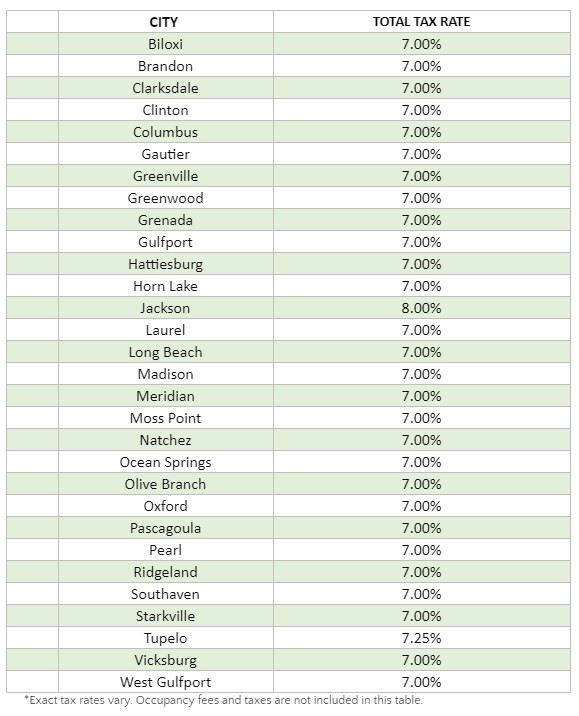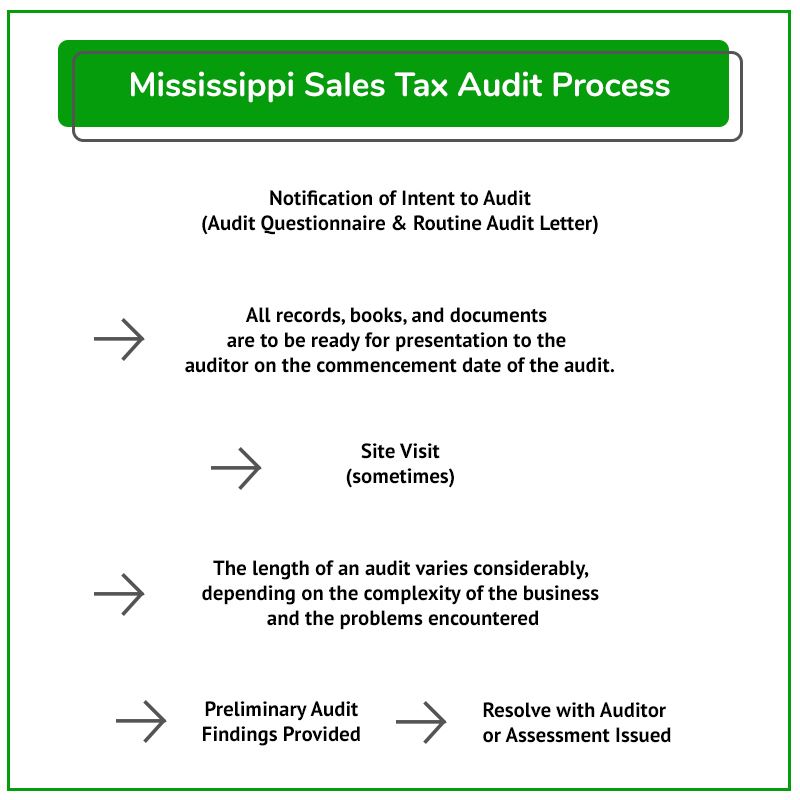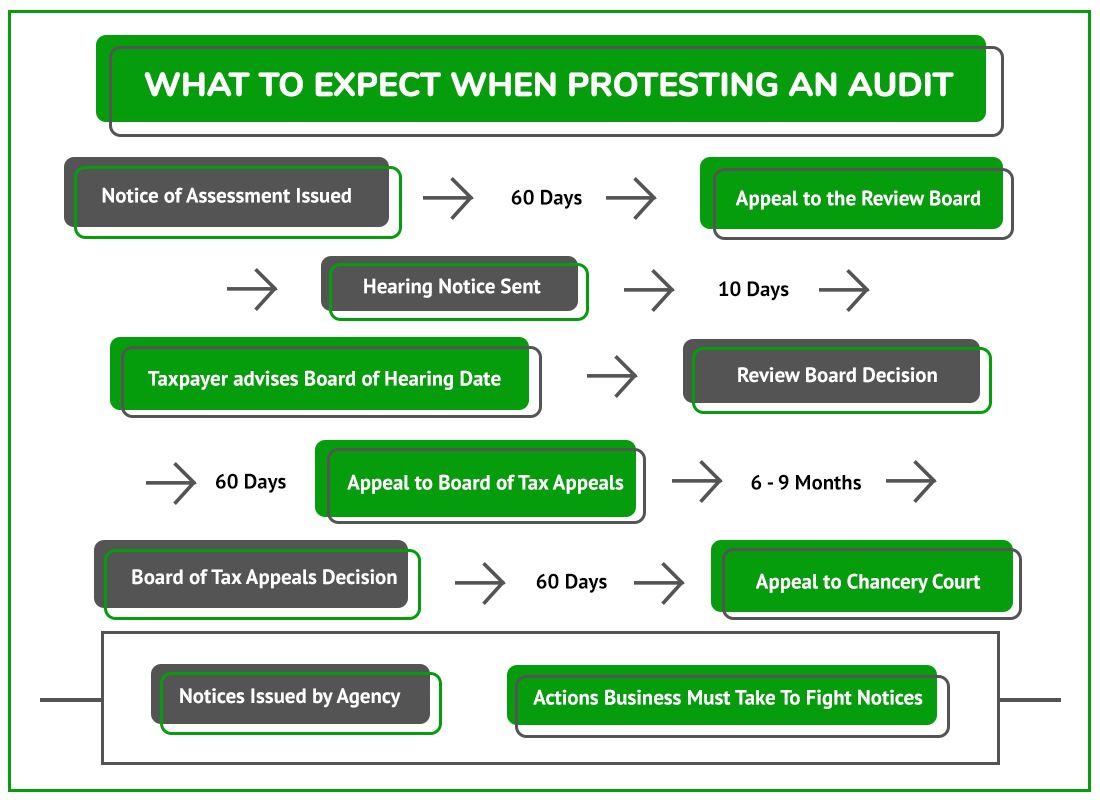
Mississippi Sales Tax & Audit Guide
Straightforward Answers to Your Mississippi Sales Tax Questions.
- Do I need to collect Mississippi sales tax?
- Should I be collecting or paying Mississippi use tax?
- What do I do if I should have been collecting but haven't?
- I received an audit notice. What should I do?
- Guidance on fighting a sales tax assessment in Mississippi.
Who Needs to Collect Mississippi Sales and Use Tax?
Like most states, to be subject to Mississippi sales tax collection and its rules, your business must:
- Have nexus with Mississippi, and
- Sell or use something subject to Mississippi sales tax.
How is Nexus Established in Mississippi?
According to the Mississippi Department of Revenue, any business with a physical presence in Mississippi must be licensed for sales tax collection. The minimum thresholds listed below for remote sellers do not apply to businesses with a physical presence in Mississippi.
Any person who meets any one of the following definitions for a vendor must license to collect and remit sales tax:
If you are in Mississippi making sales of tangible personal property, admissions, or taxable services in Mississippi.
This definition encompasses those who open an online business in Mississippi. If your online business provides taxable products or services, you must obtain a sales/use tax license and follow all the statutes that apply to a store-front business.
Any person located outside of Mississippi who creates nexus by:
- Having an office, distribution house, sales house, warehouse, or any place of business in Mississippi.
- Having people who solicit sales or advertise in Mississippi.
- Have inventory or equipment in Mississippi.
- Leasing equipment in Mississippi
- Make deliveries into Mississippi using company vehicles.
Additionally, businesses that do not have a physical presence in Mississippi can establish economic nexus by exceeding a certain annual sales threshold.
Economic Nexus (Wayfair Law) and Internet Sales in Mississippi
Effective July 1, 2018, businesses located outside Mississippi but with sales into the state exceeding $250,000 over any twelve-month period are considered to have economic nexus in the state. They must register with the Mississippi Department of Revenue to collect and remit tax.
Review this Online Seller Guidance for more details.
How is the $100,000 gross revenue threshold calculated?
The sales tax rate is applied to either the gross sales proceeds or the business's gross income, depending on the sale or service provided. "Gross proceeds of sales" is the total sales price of tangible personal property including, but not limited to, installation charges and delivery charges. Gross income is the business's total receipts or total income before any deductions.
Marketplace Providers
Marketplace providers must remit sales tax on all must collect sales and use taxes on all sales it facilitates in Mississippi if they exceed sales of $250,000 into Mississippi over any twelve-month period.
Which Sales are Subject to Mississippi Sales Tax?
General Transactions
If you have nexus in Mississippi, the next step is determining whether the products or services you sell are subject to Mississippi sales and use tax.
Unless an item is specifically exempt, sales and rentals of tangible personal property are subject to Mississippi sales tax.
The rules seem simple, but many details make applying Mississippi’s tax rules to your business challenging. We recommend scheduling a time to review your specific situation with one of our sales tax professionals.
Common Exemptions from Mississippi Sales and Use Tax:
Items exempt from Mississippi sales tax include:
- Sales of drugs, medicines, serums, vaccines, vitamins, minerals, or other nutrients for fish, livestock, and poultry production and growing.
- Sales of food products grown, made, or processed in Mississippi and sold from farmers' markets.
- All retail sales of seeds, livestock feed, poultry feed, fish feed, and fertilizers.
- Sales of defoliants, insecticides, fungicides, and herbicides used in growing agricultural products for market.
- Sales of cotton, cottonseed, and soybean, bagging, and agricultural products for market.
- Sales of coffins, caskets, and materials used in preparing human bodies for burial.
- Sales of property for immediate foreign export.
- Sales to an orphanage, old men's, and old ladies' home supported by a nonprofit organization.
- Sales to YMCA, YWCA, and Boys' and Girls' Club owned and operated by a nonprofit organization or association.
- Sales to schools and junior and senior colleges owned and operated by a nonprofit corporation or association.
- Retail sales of prescription medicines and drugs.
- Retail sales of automobiles, trucks, and truck tractors exported within 48 hours.
- Sales of electricity, gas, or other fuel and potable water for residential consumption.
- Sales to nonprofit water associations
- Wholesale sales of utilities when such utilities are for resale to consumers.
Services
Unless specifically exempt, all sales of tangible personal property are subject to the sales or use tax. The following services are subject to sales tax equal to 7% of the gross income of the business unless otherwise provided:
- Repairs of tangible personal property
- Rental or lease of personal property such as motor vehicles or equipment
- Charges for admission to amusements, sports, or recreation
- Providing taxable services such as pest control services, plumbing, electrical work, heating, and air conditioning work, computer software services, dry cleaning, and parking lots
- Rental of accommodations in hotels, motels, and campgrounds
- Contracting
- Air conditioning installation or repairs
- Automobile, motorcycle, boat, or any other vehicle repairing or servicing.
- Billiards, pool, or domino parlors.
- Bowling or tenpin alleys.
- Burglar and fire alarm systems or services.
- Car washing-automatic, self-service, or manual.
- Computer software services and sales.
- Cotton compresses and cotton warehouse.
- Custom creosoting, treating, custom planning, custom sawing, custom meat processing.
- Electricians, electrical work, wiring, repairs, or electrical equipment installation.
- Elevator or escalator installing, repairing, or servicing.
- Film developing or photo finishing.
- Foundries, machines, or general repairing
- Furniture repairing or upholstering.
- Grading, excavating, dredging, ditching, landscaping.
- Hotels, motels, tourist courts or camps, trailer parks.
- Insulating services and repairs.
- Jewelry or watch repairing.
- Laundering, cleaning, pressing, or dyeing.
- Marina services.
- Mattress renovating.
- Office and business machine repairing.
- Parking garages and lots.
- Plumbing and pipe fitting.
- Public storage warehouses.
- Radio or television installing, repairing, or servicing.
- Refrigerating equipment repairs.
Services in connection with geophysical surveying, exploring, developing, drilling, distributing, producing, or testing oil, gas, water, or other mineral resources.
- Shoe repairs.
- Storage lockers.
- Telephone answering services.
- Termite and pest control services.
- Tin and sheet metal shops.
- T.V. cable systems, subscription TV, other similar activities.
- Repairing, vulcanizing, , or recapping tires or tubes.
- Welding; and Woodworking or woodturning shops
Software
Often, people have questions about the taxability of software as a service (SaaS).
Many states already impose a tax on software as a service. As these options proliferate, states are moving to update their tax laws and, naturally, impose a tax.
To determine whether you need to collect tax on software sales, we highly recommend contacting one of our sales tax professionals to help you sort it out.
For now, we have summarized Mississippi’s software tax rules here:
Custom Software
The gross income from computer programs or software sales and services is taxable at the regular retail rate. Computer program license fees and/or maintenance contract income are also taxable. Taxable services include the design and creation of a web page.
Prewritten Software
Prewritten software, program installation, software maintenance, upgrades, and training services are taxable when the purchase of these services is included with the purchase of the software.
Shipping & Handling
Tangible personal property is subject to sales tax on the gross proceeds of the sale, including charges for shipping, handling, and delivery.
You can find more details in this document from the Mississippi Department of Revenue.
Industry-Specific Guidance
While the general sales tax rules seem straightforward, applying those rules can get tricky when gray areas arise. The Mississippi Department of Revenue provides some specific guidance for the following industries:
- Sales and Use Tax, Special Levies
- Sales and Use Tax Guide for Construction Contractors
- Optometrists, Ophthalmologists, and Eyeglass Retailers
- Medical Clinics
- Pet Breeders
- Livestock Feed Dealers
- Telecommunications Services
- Peer to Peer Rentals
- Petroleum Tax
- Gaming Tax
- Alcoholic Beverage Control
- Beer
- Tobacco
- Public Utilities, Railroads
- Amusement
- Salt Severance
- Timber Severance
- Service Providers
- Retailers
Determining Local Sales Tax Rates in Mississippi
Mississippi imposes a tax on selling tangible personal property and numerous services. The general tax rate is 7%.
Mississippi has two local tax levies at the city level but not the county level. The City of Tupelo levies an additional .25% on all retail sales and services provided within the corporate limits. The City of Jackson levies an additional 1% on certain retail sales and services provided within the corporate limits.
Additionally, many Tourism and Economic Development Taxes in many cities and counties are imposed on hotels, motels, restaurants, and bars.
Local Sales and Use Tax Tables
Here you can access charts for local Mississippi sales tax rates or see the chart below for the tax rates of the most populated Mississippi cities.

I Should Have Collected Mississippi Sales Tax, But I Didn't
Many of our competitors suggest Filing a Voluntary Disclosure Agreement in each state. This is a one-size-fits-all solution that is not always the best. Our sales tax professionals will work with you to determine your business's best and most cost-effective solution.
If you determine your business has nexus, but you have not collected Mississippi sales tax, here are your options:
- Register and pay back taxes, penalties, and interest, or
- Complete a VDA to cut penalties (and, in some cases, reduce your tax liability and avoid interest).
Here is what you need to know about each option to make the best decision for your business:
Option 1: Register to Pay Back Taxes, Penalties, and Interest
A VDA is not cost-effective if the past liabilities and penalties are minimal. Sometimes the best resolution for a business is to register with Mississippi and pay back taxes, penalties, and interest.
Be wary of the tax professionals recommending a VDA in these cases. They want to make a buck rather than look out for your best interests.
When to consider registration and payment:
- If you established nexus less than 3 or 4 years ago.
- The sales tax penalty is LESS than the professional fees charged for the VDA.
- Your business does NOT have a sales tax collected issue.
Beware: Registering does not generally end past liabilities.
If you are unsure what your past liabilities are, contact us. Our state tax professionals work with you so you can make the right choice for your business.
Option 2: Voluntary Disclosure Agreement (VDA)
Mississippi’s lookback period is three years.
In many situations, voluntary disclosures are a valuable tool to reduce extended periods of past exposure.
The voluntary disclosure limits the lookback period to three years. So, if you should have collected sales tax over the past ten years but did not, you may benefit from doing a VDA.
A VDA may be a good option for you if:
- You established nexus more than 3 or 4 years ago.
- You have a sales tax collected but not remitted issue.
- The sales tax penalty savings is MORE than the professional fees charged for the VDA.
What to Expect During an Audit
The typical audit process is shown in this flowchart. Detailed guidance for each Mississippi audit process stage follows in the sections below.

Mississippi regularly audits businesses required to charge, collect, and remit various taxes in the state. Many audits begin with a call from a Mississippi Department of Revenue sales tax auditor. Shortly after the call, your business will receive a Notification of Intent to Audit. This notification confirms that you were lucky enough to be chosen for a Mississippi sales tax audit.
Once the audit is complete, the auditor will send you the assessment and the amount.
It is good to start with getting a state and local tax professional involved to prepare for the audit.
I received a Mississippi Sales Tax Audit Notice. What Should I Do?
Businesses that receive a sales tax audit notice need to consider the following questions:
If you do not have sales tax audit experience, how can you trust that the state's auditor abides by the rules and follows proper procedures?
How will you know when to provide documents or when to push back?
Do you thoroughly understand your sales and use tax areas of exposure?
Controlling the audit is paramount to limiting exposure and shaping the results. Are you confident in doing that on your own?
Unless you can confidently answer these questions, hiring a professional is most likely to be the best option.
Contact us to learn how our sales tax professionals can give you the peace of mind and confidence you will need during your audit.
Visit our resource pages for more information to help you make critical decisions during your Mississippi sales and use tax audit.
- The Audit Overview & Selection Process
- The General Audit Process
- Statute of Limitations Extensions & Issues
- Managing the Sales Tax Auditor
What to Expect from a Mississippi Sales Tax Auditor
Here is a summary of the general audit process:
- The auditor will conduct pre-audit research.
- The auditor will often schedule and perform an entrance conference.
- The auditor will request records (many of which the auditor is not entitled to and does not need)
Once the auditor receives the necessary records, they will compare your Mississippi sales and use tax returns to your federal income tax returns or bank statements to determine whether you reported all applicable or gross sales on your Mississippi sales tax return(s).
NOTE: A slight error in how the tax was charged on even a single type of transaction can add up to a significant sales tax liability.
Once the auditor is confident all sales are accounted for, they will:
- Review your exempt and out-of-state sales.
- Conduct a use tax audit – the auditor will request accounts documents to ensure you adequately paid use tax on applicable purchases.
Common areas audited include:
- Advertising Expense
- Auto & Truck Expense
- Repair and Maintenance
- Office Expense
- Miscellaneous Expense
- Supplies
- Equipment
After reviewing all information, the auditor will prepare a proposed audit report which shows preliminary findings, and a preliminary amount due or refund. The proposed audit report is the basis for discussion between you and the auditor; it is not a final determination. It may be estimated in cases where requested information has not been provided.
If a business buys an item online without paying use tax, the business is still obligated to remit the tax to Mississippi. Believing otherwise often leads to shocking results for the unsuspecting taxpayer during an audit. Here is more information on Mississippi Use Tax.
If you have questions about your situation, contact us to discuss it with one of our tax professionals.
After the Audit – Understand and Defend Your Businesses Rights
The auditor will meet with you by phone or in-person to present the proposed report and ensure you understand the proposed adjustments.
The auditor will produce an audit report with corresponding work papers to support the Mississippi sales and use tax assessment.
It is advisable to have a sales tax professional present during this meeting. This is your first opportunity to see the auditor's findings. You will want to push back on areas where they have overstepped their bounds or misapplied Mississippi's sales tax laws.
It is best to hold off on agreeing to the sales tax assessment until a sales tax professional has reviewed it for issues that should be challenged.
| Many businesses wind up drastically overpaying the state because the business owner or in-house accounting personnel were not well versed in the sales tax laws that, if challenged, could have reduced their sales tax liability. |
In the following sections, we will cover the process of challenging a Mississippi sales tax audit assessment.
Contesting Audit Assessment After the Audit – The Appeal
Mississippi Sales Tax Audit Protest Process Flow Chart

NOTE: If the deadlines are missed, it can be impossible to get the case reopened.
You will receive a Notice of Proposed Audit Report requesting you sign (within 30 days) and indicate whether you agree or disagree with the proposed findings.
It is essential to review and understand its implications carefully.
The audit report:
- Details of the auditor's findings
- Describes any proposed audit adjustments
- Shows the amount of tax, interest, and penalty due
If you disagree with the proposed changes, you may request an informal conference with the auditor. The auditor will schedule a conference with you and their supervisor to attempt to reach an agreement.
If you and the auditor/supervisor cannot agree, the Department will issue a final notice of field audit determination. It is final unless you appeal it.
Note: Even if you signed the Notice of Proposed Audit Report indicating you disagree, you still must send a written appeal of the final notice
Audit Closing Conference
The taxpayer has a short period to contest the findings with the auditor. Any issues with the results are handled as follows:
- Issues related to exemptions, proof of tax paid, and calculations are worth addressing with the auditor.
- Legal interpretations of sales tax law are often not resolvable at this stage.
After this conference, the auditor will adjust the audit assessment, and a Notice of Determination will be issued.
If you cannot resolve this with the auditor, the next step is to appeal/protest the issue.
Appeal/Protest with The Mississippi Department of Revenue
Protest Rights and Audit Finding Confirmation
If you believe the assessment is based on a mistake of fact or an error of law, you may request a hearing with the Mississippi Department of Revenue. You must appeal the assessment within 60 days, or you may lose your appeal rights. The appeal is filed by your business, sales tax lawyer, accountant, or other representatives by filing the Review Board Appeal Petition.
Following the filing of the Petition, you will get a notice advising you of your hearing date for the appeal, which must be responded to within ten days. At the hearing, your case will be heard by a three-person Review Board panel, which is independent of the audit department. The Review Board will review documentation and argument resulting in the issuance of the decision by the Board. Although it is very informal, it is often advisable to have a sales tax attorney or another professional present your case.
If you have received a Certificate of Assessment and have not talked to someone experienced in Mississippi State tax, now is the time. Do it before these deadlines pass.
Final Decision
You will receive a notice of hearing noting the time and place of the hearing and the issues to be considered. The Department will send a letter with one of the following results:
- No change to the original assessment
- A decrease in the amount due or refund
- An increase in the amount due or refund
If you disagree with the decision of the Department of revenue, the next steps are an appeal with Mississippi Tax Appeals Commission and then the Circuit Court.
Settling a Mississippi Sales Tax Liability
After any critical notices are issued, settling your Mississippi sales tax case with the Mississippi Department of Revenue is possible by filing a Mississippi Offer in Compromise. The business must meet specific criteria to qualify, but you can get better results negotiating here than with the auditor. However, knowing a fair settlement from an unreasonable settlement will be challenging without experience and knowledge of Mississippi tax laws.
DO NOT attempt to negotiate a settlement without an experienced Mississippi state and local tax lawyer or other professional.
Contest a Mississippi Jeopardy Assessment
Mississippi may issue a Notice of Jeopardy Determination in certain situations.
The jeopardy assessment gives the Mississippi Department of Revenue the right to try to collect immediately.
Due to the jeopardy nature, the taxpayer only has a very short time to contest the assessment and must place a security deposit to fight the issue.
Administrative Hearing with The Mississippi Board of Tax Appeals
If you cannot resolve your case with the Department, you can continue to contest your sales tax assessment by appealing to the Board of Tax Appeals. The Board of Tax Appeals is like an administrative or tax court option in many states. It is an agency independent from the Mississippi Department of Revenue and specializes in hearing tax disputes.
Upon filing a Petition, the Mississippi Board of Tax Appeals will send you a notice of the hearing date and its location, likely in Jackson. The notice will also provide instructions on when to send your summary of the argument and document you intend to present. Starting with you, your Mississippi sales tax attorney, or other professional, each side presents its case before the Board. The Board will convene and render a decision within 60 days of the hearing.
It is strongly encouraged to have a representative, such as a sales tax lawyer or other professional, to present your case. It is critical to get the proper evidence and build the record if the case is ever appealed. If you have not at least spoken to a sales tax professional by this point, now is the time.
Following the decision, either side can appeal the ruling to a judicial court, which is called Chancery Court in Mississippi.
Our team has handled hundreds of administrative court cases. It can help your company receive the resolution you are entitled to. Get in touch with us today.
Other Mississippi Sales Tax Resources
Reviews

-
"Take Control of your sales tax with easy-to-use DIY tools. Get the guidance you need - without the high cost of full-service support."
Meet David, the Auto Repair Shop Owner (DIY)
- The DIY Business Owner -
"Get expert answers when you need them. Our on-demand consulting service connects you with tax professionals for quick, reliable advice—without long-term commitments."
Meet Mark, the Business Owner Who Needs Quick Answers
- The On-Demand Consultant User -
"Outsource your sales tax headaches to proven experts. Our full-service solutions handle compliance, audits, and dispute resolution—so you can focus on growing your business."
Meet Greg, the CFO of a Multi-State Manufacturing Company
- The Managed/Enterprise CFO -
"Stay in control while getting expert help when you need it. Our guided sales tax solutions give you access to professionals for compliance, audits, and appeals—without the cost of full-service management."
Meet Kris, the Multi-Store Gas Station & Convenience Operator: Multi-Location Owner (Guided Support)
- The Guided Business Owner -
"Jerry is the best!"
Jerry is the best! I made the mistake thinking I could deal with the use tax auditor on my own not realizing that I would be ...
- Gary O. -
"Sales Tax Helper Can Make Miracles Happen"
Sales Tax Helper can make miracles happen. Jerry was able to wipe hundreds of thousands of dollars off a NY sales tax bill ...
- Zalmi D. -
"I Will Definitely Be Using His Services Again"
Jerry was very helpful and listened to all our concerns. I will definitely be using his services again.
- Joyce J. -
"Representing Our Company Professionally"
Owning a Texas car dealership is demanding work, so taking on a Texas Sales Tax Audit was a daunting task for us – we didn’t ...
- Ata A.
